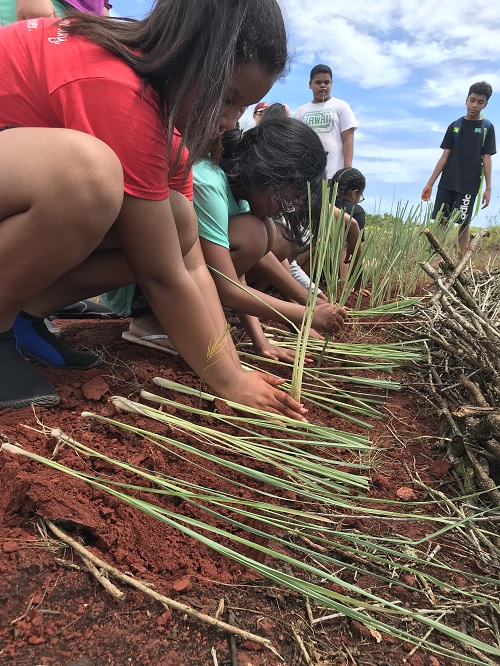
Description of the project: On small islands like Palau ecosystems are connected from ridge to reef, and inland degradation can become a significant threat to freshwater and coastal waters, diminishing the ability of mangroves and coral reefs to protect coasts. The project targets the states of Ngaremlengui and Ngiual in the Babeldaob watershed. Afforestation activities contribute since 2014 to climate change mitigation and adaptation. This is restoring bare land, ensuring water and food security, and guaranteeing mitigation measures for new housing through enhanced services from forest and mangrove ecosystems. This community led project has involved local women’s groups, youth groups, schools and households – over 550 people- for planting 1,117 native trees, 1084 vegetative strips (e.g. lemongrass strip) and ethnobotany trainings.
Climate impact: Ebiil Society’s project creates multiple benefits, increasing ecosystems’ and communities’ resilience to climate change impacts. These benefits include regulation of soil erosion and fertility loss, carbon sequestration, improved local climate, provision of freshwater resources, and restored habitat for various species. Over 2,600 trees and lemongrass were planted to resist floods and sediment runoff. Plants are grown in Ebiil’s plant nursery and distributed to households or bare soil areas at no cost to the community.
Gender impact: Twelve women from the community were identified to lead the implementation of watershed restoration plans, promoting the decision making role of women on land and the matrilineal tradition of Palauan society. Access to trainings was guaranteed to women, men, boys and girls, while elderly women were encouraged to participate as carriers and trainers of traditional knowledge. The women’s groups benefited from capacity development programs in ethnobotany, plant collection and propagation, endangered species, sustainable home gardening, soil treatment and tree planting, and erosion control.
Scalability: Tree growth monitoring conducted in collaboration with Oregon State University informs best practices for planting, depending on species, soil and other environmental variables at restoration sites. This helps in scaling up efforts across the watershed. Methods have been refined over time to ensure resilience in poor soil conditions, bird propagation, social and economic value, as well as minimum maintenance. Afforestation and restoration of degraded land can be replicated in other States, as best practices and collected data can inform housing and construction management policies.